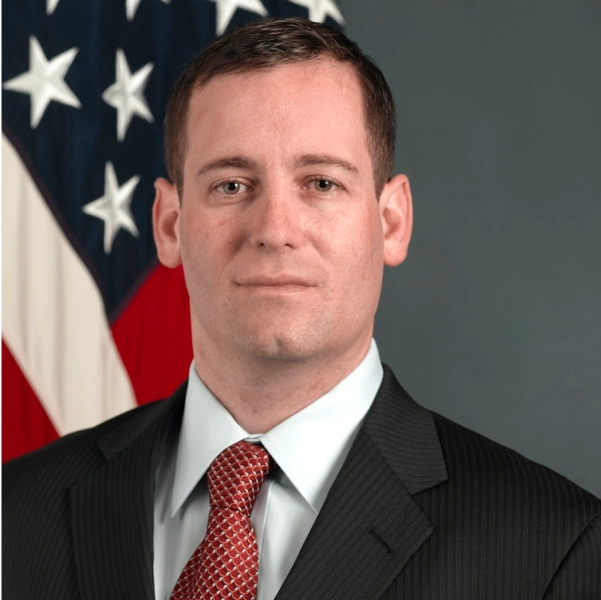
Advance Your Career with a Master of Studies in Law (MSL)
Think like a lawyer. Strategize like a leader.
Gain legal expertise, and learn to navigate the dynamic and complex fields of government procurement law, government procurement and cybersecurity law, national security and cybersecurity law, or national security and U.S. foreign relations law without obtaining a traditional JD.
Program Overview
GW Law’s MSL is designed for non-lawyers who seek to gain a fundamental understanding of the law and how it is applied in various contexts across government, nonprofit, and for-profit organizations. Our program equips you with the insight and skills necessary to confidently lead conversations and initiatives involving legal and regulatory matters. The MSL offers part-time and full-time, online and on-campus learning so you can continue to work toward professional advancement while building pertinent skills to become a valuable asset to your organization. Our graduates leverage the knowledge they gain to influence critical discussions and successfully operate in the legal and governmental realms.
24
Total Credits
Online or On Campus
Modality
Part-Time or Full-Time
Pace
$2,650*
Per Credit Hour
*Based on 2025-2026 tuition rates.

Lead in a Growing Field With Your Master of Studies in Law
You don’t have to become a lawyer to master the law. The GW MSL program provides a pathway to career advancement through four distinct concentrations that equip you with the legal specialization to guide strategic discussions and decisions.

20.8%
Job growth projection1

5M
Jobs in 20222

33,000
Alumni in our GW Law network
“The students at GW Law learn from people who not only know the law but also make the law. They are learning from people who see law as a way to impact the world today…this real-world impact aligns with our history and distinguishes GW Law as the oldest law school in the nation’s capital.”
— Dayna Bowen Matthew, Dean, GW Law
Concentrations
With a rigorous yet manageable curriculum, the GW Master of Studies in Law program offers students the flexibility to learn online, on campus or a mix of both and choose from one of three available concentrations to complete their 24-credit program: Government Procurement Law, National Security & Cybersecurity Law, or Government Procurement & Cybersecurity Law.
Concentrations
With a rigorous yet manageable curriculum, the GW Master of Studies in Law program offers students the flexibility to learn online, on campus or a mix of both and choose from one of four available concentrations to complete their 24-credit program: Government Procurement Law, Government Procurement & Cybersecurity Law, National Security & Cybersecurity Law, or National Security & Foreign Relations Law.
Government Procurement Law students gain a rich understanding of how procurement systems operate, both in the U.S. and abroad, and become skilled at navigating the legal complexities inherent in the space. We provide our graduates with the knowledge, connections and opportunities to become future leaders and policy-makers in the acquisition community domestically and abroad.
Explore Full ConcentrationWithin the field of government procurement law, there is an increasing demand for cybersecurity legal expertise among government procurement practitioners. The field heavily relies on skilled legal reasoning and policy interpretation by acquisition professionals in federal agencies, private firms, and industry. This concentration meets the evolving needs of professionals who work on these cutting-edge issues.
Explore Full ConcentrationExplore the legal and policy issues surrounding national security, cybersecurity, AI, big data, and new technologies, and understand how nation-states, individuals, and corporations seek to exploit and protect against vulnerabilities in order to conduct war or disrupt, destroy, or threaten essential services. The field includes law on the use of securing critical cyber infrastructure, cyber breaches, armed forces and intelligence operations abroad, counterterrorism, homeland security, management of crises, congressional oversight and classified information.
Explore Full ConcentrationNational Security & U.S. Foreign Relations Law students develop expertise in U.S. law that shapes national security and foreign policy. They explore the legal aspects of counterterrorism, armed forces abroad, intelligence operations, and the protection of critical infrastructure. Our graduates are prepared to navigate complex legal issues and pursue careers influencing national security and international relations policy.
Explore Full ConcentrationExperience
GW Law is committed to cultivating an exceptional student experience. Our Master of Studies in Law program is designed with a flexible learning approach that allows students to study 100% online, on campus, or both modalities interchangeably. We invest in our students’ success through strong academic and professional support that includes mentorship, networking, and one-on-one career counseling. Our location in the heart of Washington, D.C., provides students with access to the nation’s most influential legal and policy activity, making our program immersive and unparalleled.
Key Classroom Activities
MSL students gain a deeper knowledge of the law relevant to their field and also learn how to leverage that knowledge to better inform strategy and decision-making through a combination of synchronous, asynchronous, and immersive learning activities, including:
- Analytical reading and comprehension of legal materials.
- Dynamic interactive synchronous discussion sessions.
- Guest lectures and discussions with leading experts in the field.
- Mock negotiations and other role-play activities.
- Moderated discussions.
- Oral advocacy.
- Practice writing for a variety of audiences.
- Self-paced lecture videos.
- Written legal analysis and advocacy.
- Discussion boards.
Learning Outcomes
GW MSL students gain foundational and specialized knowledge of laws and policies and become well-equipped to:
- Identify and articulate legal aspects of problems.
- Identify and communicate to non-lawyers regarding legal risks and how to reduce them.
- Problem-solve through a legal framework.
- Succinctly express complex ideas.
- Understand how the law can allow for different outcomes.
- Understand the current legal landscape.
- Understand foundational legal concepts.
- Write persuasively in a well-organized format for a variety of audiences.
Career Outcomes
Our graduates are recruited and employed by prominent government agencies, private corporations and nonprofits, including:
- Amazon
- Boeing
- Department of Defense
- Department of Homeland Security
- General Dynamics
- General Services Administration (GSA)
- Lockheed Martin
- Meta
- Northrop Grumman
- Raytheon

FAQ
Looking for an answer not listed on our site? Connect with our team today.
A Master of Studies in Law degree is designed for non-lawyers who need a working knowledge of the law. Our graduates are equipped with in-depth expertise and training to navigate the complex legal landscape with confidence.
You can earn your degree both online and on campus interchangeably as it suits your schedule.
You can earn your MSL degree in 12-16 months at a full-time pace or in 24-36 months at a part-time pace.
The program is offered both part-time and full-time.
No. You do not need to live in the Washington, D.C., area to enroll in the program. The online modality allows you to earn your degree from anywhere.
Yes. The MSL program is designed with working professionals in mind. The part-time, online pace allows you to earn your degree without putting your career on hold.
MSL applicants must have a minimum of three to five years of professional experience related to their area of concentration, as assessed by program directors and deans.
No. There are no on-campus requirements for the program.
Students may change concentrations with permission from the program director. Please note that doing so can extend your time in the program and delay the earning of your degree.
No. There is no GPA requirement to apply to the MSL program.
Students in the MSL program are required to complete 24 credit hours. On average, students can earn their degree in 12-16 months at a full-time pace or 24-36 months at a part-time pace.
Yes. Students have a variety of options to fund their education. Request more information, and an enrollment adviser will contact you to answer any questions you may have.
Connecting with an enrollment adviser will help you:
- Understand the program admissions criteria and know whether you are eligible to apply.
- Gain insight into application best practices and how to submit a strong application.
- Know what to expect in your online classroom, including the level of faculty interaction, program outcomes and more.
- Have an immediate line of support in the event you have questions or need clarification about the MSL program.
Faculty
GW Law faculty members are scholars and practitioners with strong reputations in the legal community. You’ll learn from law faculty members who are among the most cited in the nation across world-renowned media outlets and are active in their fields at government agencies and businesses such as the U.S. General Services Administration (GSA), Microsoft, Google and more.

Jonathan G. Cedarbaum

Lisa M. Schenck

Steven L. Schooner

Jessica Tillipman

Daniel Justin Solove

Laura A. Dickinson

Christopher R. Yukins

Paul Schiff Berman

Maria Swaby

Hallie Tremaine Balkin

Christopher W. Savage

Phil Carter
Master the Law with Your MSL
Schedule a CallTell us about yourself.
Sharing some details will help us customize your experience. A bachelor’s degree is required to attend.
¹ The American Bar Association
² Lightcast (2022)